Lake City Has Two New Council Members – With the Controversies Surrounding the City, This Is a Big Deal
November 23, 2022 4:45 am
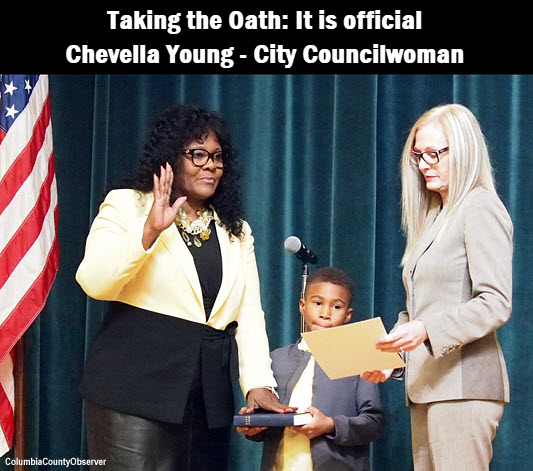
Chevella Young takes the oath as son Chanze Reed
makes sure the City Clerk gets it right.
LAKE CITY, FL – Monday evening, meeting in the School District auditorium to accommodate the turnout, two newly elected City Council members took the Oath of Office. This is a big deal. What does this mean?
Background: Where does the oath come from?
The oath comes from Section 5(b), Art. II, of the State Constitution:
(b) Each state and county officer, before entering upon the duties of the office, shall give bond as required by law, and shall swear or affirm:
“I do solemnly swear (or affirm) that I will support, protect, and defend the Constitution and Government of the United States and of the State of Florida; that I am duly qualified to hold office under the Constitution of the state; and that I will well and faithfully perform the duties of (title of office) on which I am now about to enter. So help me God."
There is no requirement that the oath be administered orally. The only requirement is that a written oath be filed with the City Clerk.
The City Charter, Section 513, explains: Every officer of the city shall, before entering upon the duties of his office, take and subscribe to an oath or affirmation to be filed and kept in the office of the city clerk; which oath shall be in the form prescribed for state officers by the Constitution of the state.
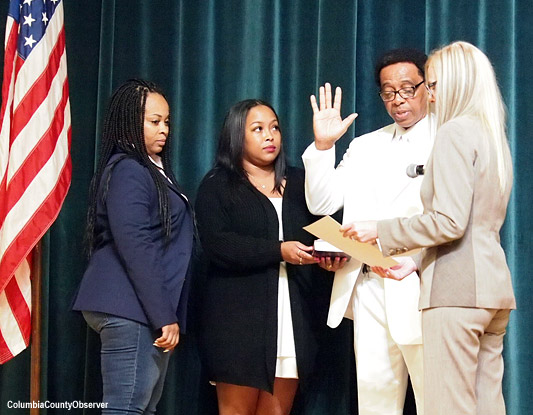
Ricky Jernigan takes his Oath of Office. His
daughter Tiara Jernigan (holding the bible) and
God-daughter Shavon Clark look on.
That is pretty simple, so what does that mean?
Lake City's boundaries are a hodge-podge. While they define the geographical limits of Lake City, the City Charter spells out that Lake City is also the four elected council members and mayor. The Charter is clear:
All powers of the City shall be vested in the city council, to be also known as "council," except as provided by law or this Charter.
Article II of the City Charter spells out the powers of the City, which is really the City Council.
The Council members can do lots of stuff. They create positions, pass budgets, create and rescind ordinances and resolutions, buy, zone, re-zone, condemn property, levy taxes, borrow and spend money for public purposes, levy special assessments, own and operate a public utility, and finally,
The City Council can implement a policy and program of affirmative action to provide equal employment opportunity for affected classes who have been underemployed due to their race, color, national origin, sex, [or] marital status.
The City Council can also enter into contracts and agreements with local, state, and the federal government.
Investigations
Section 307 of the City Charter allows the City Council to investigate the city's affairs and the conduct of any city department, office, or agency. To this end, the Council may subpoena witnesses, administer oaths, take testimony and require the production of evidence. Those that don't comply with a lawful order made during a council investigation may find themselves in jail.
Last Night In City Hall (School Bd. Admin.
Bldg.)
Councilman Jernigan's Failure to Vote
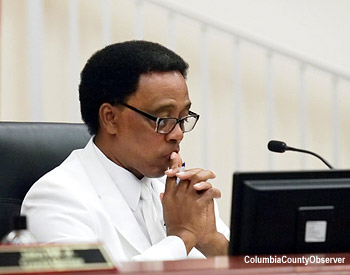
Councilman Jernigan during the vote to give the
PD a 6% raise outside of the recently approved
collective bargaining agreement.
Florida law is clear that unless a council member declares a conflict, he or she must vote; silence is counted as an affirmative vote.
Mr. Jernigan did not speak to the resolution; it is unknown if he knew that his silence was considered a "yes" vote.
Twice, the City Clerk asked Mr. Jernigan for his vote. Twice, Mr. Jernigan neither moved nor spoke.
The title of the resolution was unclear and insufficient.
The Florida Statutes [166.041(2)] sets the minimum requirements for what needs to be in a resolution. It is not complicated. "Each . . . resolution shall be introduced in writing and shall embrace but one subject and matters properly connected therewith. The subject shall be clearly stated in the title."
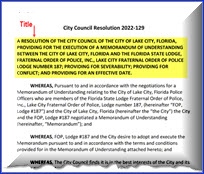 This is the minimum requirement. The City
Council can pass a policy making the requirement
more specific to ensure the City Council and the
public are apprised of the subject matter of a
resolution or ordinance.
This is the minimum requirement. The City
Council can pass a policy making the requirement
more specific to ensure the City Council and the
public are apprised of the subject matter of a
resolution or ordinance.
The statute leaves it up to the producer of the resolution to determine what the subject is and what to include.
The title: the general rule of thumb is this: “The title should be clear and concise and convey the general idea of the topic of the resolution.” This is the rule of the Pennsylvania Academy of Physicians and many others.
The editors of Business Management Daily give this example: “A resolution of the board of directors of XYZ adopting a non-smoking policy.”
Humboldt State University gives the following guideline: “The title of the resolution must appropriately reflect the intent.”
While this may sound simple enough, former City Attorney Fred Koberlein, Jr., had problems with this. Now, the new City Attorney is on the same track.
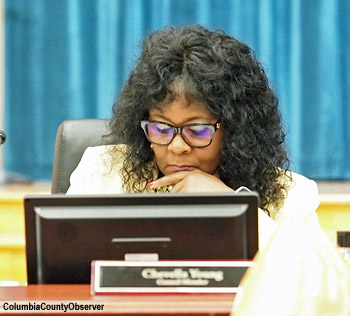
Councilwoman Young studies the agenda.
The resolution that silenced Councilman Jernigan referred to a Memorandum of Understanding which gave the police union membership a six percent pay raise on top of the significant raises it negotiated in its recent three-year contract with Lake City.
The new City Attorney, Todd Kennon, read Resolution 2022-129, by title: A resolution of the City Council of the City of Lake City, Florida, providing for the execution of a memorandum of understanding between the City of Lake City, Florida and the Florida State Lodge, Fraternal Order of Police, Inc., Lake City Fraternal Order of Police Lodge Number 187; providing for severability; providing for conflict; and providing for an effective date.
The Memorandum of Understanding appears to have been typed in 10-point type, which is hard to read.
After the meeting, Mr. Jernigan told a local TV station that he didn’t vote because he didn’t have enough information to make an informed decision.
While most of the information was in the 12th-hour agenda packet, a resolution title that would have mentioned the 6% raise would have been helpful to Mr. Jernigan, the Council, and the public.
Epilogue
Sworn in and ready for action, Council members Chevella Young and Ricky Jernigan, along with the rest of the Council, can now legislate the changes they feel will benefit Lake City, because they are Lake City.
